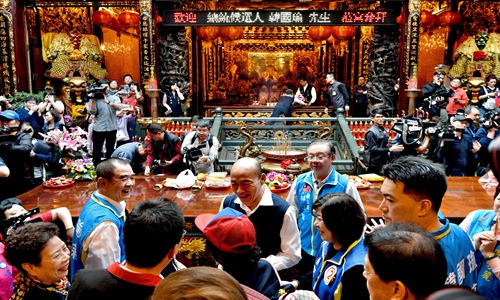Taiwan prepares for regional elections
HK card to have ‘little influence on election’

Han Kuo-Yu (center), "presidential candidate" for Taiwan's main opposition Kuomintang (KMT) party, is greeted by the supporters while visiting Chingan temple on the campaign trail in Keelung on Tuesday, ahead of the Sunday "presidential" and "parliamentary" elections. Photo: AFP
Taiwan residents will head to the polls for the 2020 Taiwan elections on Saturday amid accusations of the mainland meddling and the influence of Hong Kong's social unrest. Photo: Xinhua
Facing increasing challenges in cross-Straits relations as "Taiwan independence" forces grow, Chinese mainland officials and analysts warned that reunification of the motherland is an inevitable trend regardless of who wins.
The number of eligible voters for Taiwan's upcoming "presidential" and "vice presidential" election is 19.31 million, an increase of 528,114 from the 2016 contest, news website Taiwan Today reported on Wednesday, citing data from the Central Election Commission. The number of registered voters in 2016 was 18,782,991.
Tsai Ing-wen and her running mate Lai Ching-te of the Democratic Progressive Party (DPP) are running against Han Kuo-yu and Chang San-cheng of the Chinese Kuomintang (KMT) party.
In her fight to retain her "presidency," Tsai, repeatedly referred to Hong Kong's social unrest as a cautionary tale for the island against the mainland, even creating a slogan: "Hong Kong today, Taiwan tomorrow."
In light of Tsai's handling of cross-Straits relations over the past few years, Chinese mainland analysts said the upcoming elections in Taiwan remain complicated and would be more worrisome if she wins.
The number of registered voters indicates that the running parties have fully mobilized their supporters and the election will be a face-off between party bases where Tsai could hold the advantage over other candidates, Jin Yi, a research fellow at the Institute of Taiwan Studies of the Chinese Academy of Social Sciences in Beijing, told the Global Times on Wednesday.
The result remains hard to predict, as alleged fake polls and disinformation also weigh on candidates, analysts said.
To blame Beijing for meddling in the election was groundless as reunification is inevitable and the mainland will not see the election result as an important factor affecting this process.
Hong Kong card
Han, Tsai's opposing candidate from the 1992 Consensus-endorsing KMT, criticized his rival at a live TV debate on December 29 for using the blood of Hong Kong young people to favor her candidacy.
"Your vote is based on the bleeding body of the Hong Kong people, and you are exploiting their value," Han said, BBC reported.
In her new campaign video, Tsai also highlighted so-called challenges that Hong Kong's young generation are facing during months of protests, undermining the "one country, two systems" principle.
The video tells a one-sided story of Hong Kong unrest by focusing on so-called police brutality and is also part of the DPP's continuing efforts to incite anti-mainland sentiment, analysts said.
"Using the Hong Kong card has a very temporary influence, which also won't last long," Yang Lixian, a research fellow at the Beijing-based research center of cross-Straits relations, told the Global Times on Wednesday.
Playing the Hong Kong card may not work out as expected, Yang said, as the Hong Kong situation is cooling and the US, too, has been shifting its attitude toward this matter.
Meanwhile, the experts noted how the West has been hyping Chinese mainland efforts to "infiltrate" Taiwan's regional election, highlighted by the remarks of Wang Liqiang, a self-claimed spy defector who the mainland authorities showed in late November was a convicted fraudster.
Wang told the Australian Intelligence Organization that the mainland offered 20 million yuan ($2.88 million) in support of Han's election bid.
In December the US Senate gave final passage to the 2020 National Defense Authorization Act, a provision of which mandates a report on any Chinese mainland interference in Taiwan's elections and regulates that the US Director of National Intelligence is required to submit the report to Congress within 45 days of the January 11 Taiwan election.
Analysts also concluded that such developments could be gathered as evidence to illustrate that it was the US that has been trying to influence the regional election, rather than the Chinese mainland.

While some Western media emphasized that the mainland's next crisis will be in the upcoming regional election, mainland analysts and officials reiterated how to deal with cross-Straits relations depends on the mainland's development, and the vote won't disrupt the pace of the reunification process.
Liu Jieyi, director of the Beijing-based Taiwan Work Office of the Communist Party of China Central Committee and the Taiwan Affairs Office of the State Council, said in his 2020 new year's speech that if the two sides could take on a peaceful development path, Taiwan compatriots could fully enjoy the benefits.
Otherwise, confrontation and hostility across the Straits created by a tiny minority would harm the interests and benefits of Taiwan compatriots, he said.
The bright prospects for the peaceful development of cross-Straits relations require the joint efforts of compatriots on both sides, which requires the Taiwan compatriots' correct choice, the senior official said, while noting that the trend toward reunification of the motherland was irresistible.
Some expressed concerns that if Tsai wins the election, she could continue to promote anti-mainland sentiments and enact anti-mainland bills in exchange for US endorsement.
"The especially dangerous part is Tsai's likely increasing military reliance on the US, and that would challenge the bottom line of reunification, leading to military clashes and conflicts across the Taiwan Straits," said Jin.